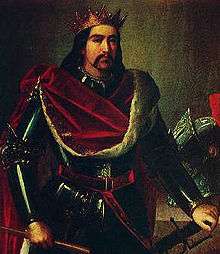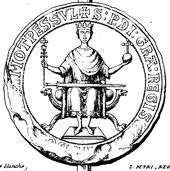Peter II of Aragon
| Peter II | |
|---|---|
 Portrait of Peter II, by Manuel Aguirre Monsalbe (1851-54) | |
| King of Aragon Count of Barcelona | |
| Reign | 25 April 1196 – 12 September 1213 |
| Coronation | 1205 in Rome |
| Predecessor | Alfonso II |
| Successor | James I |
| Born |
July 1178 Huesca |
| Died |
12 September 1213 (aged 35) Muret |
| Burial | priory of San Juan de Sijena |
| Spouse | Marie of Montpellier |
| Issue | James I of Aragon |
| House | House of Barcelona |
| Father | Alfonso II of Aragon |
| Mother | Sancha of Castile |
| Religion | Roman Catholicism |
Peter II the Catholic (July 1178 – 12 September 1213) was the King of Aragon and Count of Barcelona from 1196 to 1213.
He was born in Huesca,[1] the son of Alfonso II of Aragon and Sancha of Castile. In 1205 he acknowledged the feudal supremacy of the papacy and was crowned in Rome by Pope Innocent III, swearing to defend the Catholic faith (hence his surname, "the Catholic"). He was the first king of Aragon to be crowned by the pope.
In the first decade of the thirteenth century he commissioned the Liber feudorum Ceritaniae, an illustrated codex cartulary for the counties of Cerdagne, Conflent, and Roussillon.
On June 15, 1204 he married (as her third husband) Marie of Montpellier, daughter and heiress of William VIII of Montpellier by Eudocia Comnena. She gave him a son, James, but Peter soon repudiated her. Marie was popularly venerated as a saint for her piety and marital suffering, but was never canonized; she died in Rome in 1213.

He participated in the Battle of Las Navas de Tolosa in 1212 that marked the turning point of Arab domination on the Iberian peninsula.
The Crown of Aragon was widespread in the area that is now southernwestern France, but which at that time was under the control of vassal local princes, such as the Counts of Toulouse. The Cathars or Albingenses rejected the authority and the teachings of the Catholic Church. Innocent called upon Louis VIII of France to suppress the Albigenses. Under the leadership of Simon of Montfort a campaign was launched. The Albigensian Crusade, begun in 1209, led to the slaughter of approximately 20,000 men, women and children, Cathar and Catholic alike. Over the course of twenty years military campaigns essentially destroyed the previously flourishing civilization of Occitania and by 1229 brought the region firmly under the control of the King of France, and the Capetian dynasty from the north of France.
Peter returned from Las Navas in autumn 1212 to find that Simon de Montfort had conquered Toulouse, exiling Count Raymond VI of Toulouse, who was Peter's brother-in-law and vassal. Peter crossed the Pyrenees and arrived at Muret in September 1213 to confront Montfort's army. He was accompanied by Raymond of Toulouse, who tried to persuade Peter to avoid battle and instead starve out Montfort's forces. This suggestion was rejected.
The Battle of Muret began on September 12, 1213. The Aragonese forces were disorganized and disintegrated under the assault of Montfort's squadrons. Peter himself was caught in the thick of fighting, and died as a result of a foolhardy act of bravado. He was thrown to the ground and killed. The Aragonese forces broke in panic when their king was slain and Montfort's crusaders won a crushing victory.
The nobility of Toulouse, vassals of the Crown of Aragon, were defeated. The conflict culminated in the Treaty of Meaux-Paris in 1229, in which the integration of the Occitan territory into the French crown was agreed upon.
Upon Peter's death, the kingdom passed to his only son by Marie of Montpellier, the future James the Conqueror.
Ancestry
| Ancestors of Peter II of Aragon | ||||||||||||||||||||||||||||||||||||||||||||||||||||||||||||||||||||||||||||||||||||||||||||||||||||||||||||||||||||||||||||||||||||||||||||||||||||||||||||||||||||||||||||||||||||||||||||||||||||||||||||||||||||||||||||||||||||||||||||||||||||||||||||||||||||||||||||||||||||||||||||||||||||||||||||||||||||||||||||||||||||||||||||||||||||||||||||||||||||||||||||||||||||||||||||||||||||||||||||||||||||||||||||||||||||||||||||||||||||||||||||||||||||||||||||||||||||||||||||||||||||||||||||||||||||||||||||||||||
|---|---|---|---|---|---|---|---|---|---|---|---|---|---|---|---|---|---|---|---|---|---|---|---|---|---|---|---|---|---|---|---|---|---|---|---|---|---|---|---|---|---|---|---|---|---|---|---|---|---|---|---|---|---|---|---|---|---|---|---|---|---|---|---|---|---|---|---|---|---|---|---|---|---|---|---|---|---|---|---|---|---|---|---|---|---|---|---|---|---|---|---|---|---|---|---|---|---|---|---|---|---|---|---|---|---|---|---|---|---|---|---|---|---|---|---|---|---|---|---|---|---|---|---|---|---|---|---|---|---|---|---|---|---|---|---|---|---|---|---|---|---|---|---|---|---|---|---|---|---|---|---|---|---|---|---|---|---|---|---|---|---|---|---|---|---|---|---|---|---|---|---|---|---|---|---|---|---|---|---|---|---|---|---|---|---|---|---|---|---|---|---|---|---|---|---|---|---|---|---|---|---|---|---|---|---|---|---|---|---|---|---|---|---|---|---|---|---|---|---|---|---|---|---|---|---|---|---|---|---|---|---|---|---|---|---|---|---|---|---|---|---|---|---|---|---|---|---|---|---|---|---|---|---|---|---|---|---|---|---|---|---|---|---|---|---|---|---|---|---|---|---|---|---|---|---|---|---|---|---|---|---|---|---|---|---|---|---|---|---|---|---|---|---|---|---|---|---|---|---|---|---|---|---|---|---|---|---|---|---|---|---|---|---|---|---|---|---|---|---|---|---|---|---|---|---|---|---|---|---|---|---|---|---|---|---|---|---|---|---|---|---|---|---|---|---|---|---|---|---|---|---|---|---|---|---|---|---|---|---|---|---|---|---|---|---|---|---|---|---|---|---|---|---|---|---|---|---|---|---|---|---|---|---|---|---|---|---|---|---|---|---|---|---|---|---|---|---|---|---|---|---|---|---|---|---|---|---|---|---|---|---|---|---|---|---|---|---|---|---|---|---|---|---|---|---|---|---|---|---|---|---|---|---|---|---|---|---|---|---|---|---|---|---|---|---|---|---|---|---|---|---|---|---|---|---|---|---|---|---|---|---|---|---|---|---|---|---|---|---|---|---|---|---|---|---|---|---|---|---|---|---|---|---|---|---|---|---|---|---|---|---|---|---|---|---|---|---|---|---|---|---|---|---|---|---|---|---|---|---|---|---|---|---|---|
| ||||||||||||||||||||||||||||||||||||||||||||||||||||||||||||||||||||||||||||||||||||||||||||||||||||||||||||||||||||||||||||||||||||||||||||||||||||||||||||||||||||||||||||||||||||||||||||||||||||||||||||||||||||||||||||||||||||||||||||||||||||||||||||||||||||||||||||||||||||||||||||||||||||||||||||||||||||||||||||||||||||||||||||||||||||||||||||||||||||||||||||||||||||||||||||||||||||||||||||||||||||||||||||||||||||||||||||||||||||||||||||||||||||||||||||||||||||||||||||||||||||||||||||||||||||||||||||||||||
References
- ↑ Antonio Ubieto Arteta, Creación y desarrollo de la Corona de Aragón, Zaragoza, Anubar (Historia de Aragón), 1987, págs. 187-188. ISBN 84-7013-227-X.
- ↑ From Louis Blancard, Iconographie des sceaux et bulles, 1860.
Sources
| Wikimedia Commons has media related to Peter II of Aragon. |
- Sumption, Jonathan. The Albigensian Crusade. 2000.
- (Spanish) Martín Alvira-Cabrer, 12 de Septiembre de 1213: El Jueves de Muret, Universitat de Barcelona, Barcelona, 2002.
- (Spanish) Martín Alvira-Cabrer, Muret 1213. La batalla decisiva de la Cruzada contra los Cátaros, Ariel, Barcelona, 2008 and 2013.
- (Spanish) Martín Alvira-Cabrer, Pedro el Católico, Rey de Aragón y Conde de Barcelona (1196-1213). Documentos, Testimonios y Memoria Histórica, 6 vols., Zaragoza, Institución Fernando el Católico (CSIC), 2010 (on line).
| Regnal titles | ||
|---|---|---|
| Preceded by Alfonso the Troubadour |
King of Aragon Count of Barcelona 1196–1213 |
Succeeded by James the Conqueror |
| ||||||||||||||||||||||||||||||||||||||||||||||||||||||||||||||||||||||||||
| ||||||||||||||||||||
|
.svg.png)